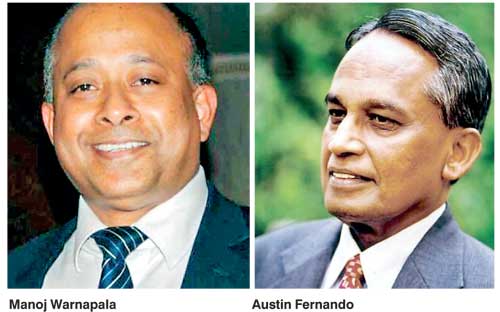Monday Feb 23, 2026
Monday Feb 23, 2026
Tuesday, 3 November 2015 00:03 - - {{hitsCtrl.values.hits}}
“When the Sri Lankan President’s motorcade encounters a red light now on the streets of the capital, Colombo, it does something unthinkable just months ago—it stops and waits for a green signal.” This was the anecdotal point of reference with which TIME Magazine accentuated the promise of the Maithri presidency.
You cannot step in the same river twice. That is the perpetual tragedy of the human kind. President Sirisena and Premier Wickremesinghe are human. This commentary is a plain speaking effort to repossess the spirit of the movement that made 8 January possible.
8 January was an idea of which the time had arrived. Even Gotabaya knew it. When he made those wide walkways on the banks of  the Diyawanna, he was in effect conceding the inevitable. The people at every level wished to participate in the leadership process. The walkways were claimed by Bata and DSI slippers people. Nike, Adidas and Puma class still yearn for Mahinda in their Facebook.
the Diyawanna, he was in effect conceding the inevitable. The people at every level wished to participate in the leadership process. The walkways were claimed by Bata and DSI slippers people. Nike, Adidas and Puma class still yearn for Mahinda in their Facebook.
The new President himself stressed the import of the movement that catapulted him to the presidency with disarming sincerity. He told TIME Magazine, “For a short period after being elected, I was not really certain that I am the President.”
In less than eight weeks, we will reach the first anniversary of the Maithri presidency. The avidity of late January has turned to abject apathy in early November.
This commentary is constructed on the reasonable premise that history is the sum total of things that could have been avoided. The election of President Maithripala Sirisena was the result of an idea whose time had come.
Ideas are not intellectual toys. Ideas have good or bad consequences. That is what we call the ‘real world’.
This is an effort to understand that real world which holds the President and Prime minister hostage to political and parochial compulsions. It appears that both have put politics ahead of governance.
Now what is wrong with that? Governance is the process of steering and managing the government. Politics is about parleying on who gets the opportunity to either govern or to pull the strings of governance. One is a process. The other is a vocation. Governance is about baking the pie. Politics is about distributing the pie.
Though it seems unfair, the Government of President Sirisena and Prime Minister Wickremesinghe has to be held to ethical standards with a cruel scrutiny that has no precedent. They sought and obtained a mandate for good governance. In the age of broadband connectivity their omissions and commissions are condemned or hailed instantly and irretrievably.
Governance is a concept subject to qualitative assessment. Government is a physical entity about which we can do nothing until the next election. We the people can do little about government. But we can surely keep vigil and scream from rooftops on the quality of governance.
That is precisely what this commentator proposes to do by citing the example of Manoj Warnapala who has been appointed by the Government that promised good governance as the new Counsellor in our High Commission in London.
He is a Solicitor domiciled in the United Kingdom. Until his new diplomatic appointment he practiced as a solicitor with Caveat Solicitors Ltd., TEK House, and 11-13 Uxbridge Road, London, W12 8LH. The blurb in its website informs us that Manoj Warnapala currently heads the firm’s housing department. He joined Caveat Solicitors in June 2015 as head of the housing department. Manoj qualified in 2013 and has over 10 years’ experience in housing which has given him supervisory status with the Legal Aid Agency in this area of law. He specialises in homelessness and community care, challenging local authorities’ decisions by way of review, county court appeal and judicial review… Manoj is fluent in Sinhalese and has a wide range of skills that enable him to represent different types of clients from all backgrounds. [http://www.caveatsolicitors.com/our-people]
Manoj Warnapala is the son-in-law of Austin Fernando, distinguished public servant, Governor of the Eastern Province, presidential  confidante, and handpicked Defence Secretary of Prime Minister Ranil Wickremesinghe and the author of the tome ‘My Belly is White – Reminiscences of a Peacetime Secretary of Defence’. Austin Fernando is therefore the quintessential insider of the Maithri-Ranil consensus Government.
confidante, and handpicked Defence Secretary of Prime Minister Ranil Wickremesinghe and the author of the tome ‘My Belly is White – Reminiscences of a Peacetime Secretary of Defence’. Austin Fernando is therefore the quintessential insider of the Maithri-Ranil consensus Government.
This commentator derives no pleasure in this distasteful exercise of criticising a distinguished public servant he has neither met nor dealt with. But for this injudicious episode, this commentator may have never concerned himself with the career path of a young solicitor in London.
Austin Fernando is the author of the tome ‘My Belly is White,’ He explains why he titled the book ‘My Belly is White,’ He says that on reading the book, most readers will find that “we were not the ghosts or hangmen as projected by our political opponents. It would be as in the folk story I have read in the ‘Gab Boys’ written by Cameron Duodu a Ghanaian writer.”
In the folk tale, the Snake Oprammire, unjustly accused and cut in two, exposes its ‘pure’ white belly and appeals to god that his heart is as white as the underside of its belly. The author seeks to ‘exonerate’ himself and his colleagues from the charges levelled against them during the Cease Fire Agreement. He makes the point that public servants can only rise to the call of duty.
It was only after Austin Fenando emerged as a prominent figure in the post-8 January 2015 firmament, that this commentator read the book ‘My Belly is White’. It was only to discover the man who was publicly acknowledged by the new President as one who mentored him in his early days.
The author of ‘My Belly is White’ is an idealistic, upright public servant. On page 189 of his magnum opus, Fernando reproduces an extract from the poem ‘God give us men’ by Josiah Gilbert Holland:
“God,give us Men! A time like these demands
Strong minds, great hearts, true faith and ready hands;
Men whom the lust of office does not kill;
Men whom the spoils of office cannot buy;
Men who possess opinions and a will;
Men who have honor; men who will not lie…”
Then he laments: “For six decades God has not heard our prayers, even sparingly.”
With that detour to God’s garden behind us, we return to folk tales.
There is another African folk tale that is far more relevant to the good governance project of President Maithripala Sirisena. It is a folk tale of the Ndebele tribe in Southern Africa. It is about the Great Race between the Hare and the Tortoise.
It is borrowed from that marvellous anthology of South African folk tales – ‘The Quivering Spear’ by Thomas A. Nevin.
The tale narrated around Ndebele fires in Southern Transvaal is quite reminiscent of the race between Mahinda the Hare and Maithri the Tortoise. We all know that Mahinda the Hare did not go for a nap in the middle of the race as in the tale of Aesop.
The story is about Umvundla the Hare and Ufudu the Tortoise. Once the challenge was made and accepted the race was to be from the home of Ufudu the Tortoise to the big rock pool. Ufudu gathered all the tortoises two days before the race.
Now if you had been at that meeting of Tortoises you would realise that all tortoises look alike. That was the ‘Aluth Parapura’. He told his Tortoise colleagues ‘This is what you should do. The race takes place from my home to the rock pool. Each one of you must hide in a different place and wait. Then sharp at noon each one of you must walk towards the rock pool.
Ufudu the Tortoise then allocated a spot for each tortoise along the race course. Now to revert to Thomas Nevin’s engaging prose. “At the starting line, the Hare hopped from one foot to another. The Tortoise stood quietly waiting. He was completely relaxed. “
‘Indlovu’ the Elephant had been appointed the official starter. He lifted his trunk and issued a piercing trumpet call. The race was on. The Hare sprinted off. In seconds he was out of sight. The Tortoise took a few lumbering steps and then walked off to the glade.
Meanwhile the Hare was baffled. Every time he looked up there was Ufudu the Tortoise ahead of him. He took one last bit of strength and bounded towards the finishing line. But before he got there, he gave a cry and collapsed. Ufudu the Tortoise was waiting for him!
The race on 8 January was won because all we tortoises, 6,217,162 of us, crawled to the rock pool in unison. It is no folk tale. It was a miracle. No one has the right to maim a miracle.
We have now subscribed to the Open Government Partnership. We are yet to agree on a code of standards in public life.
The Prime Minster is known to favour Latimer House Principles on Judicial standards. His administration may not frown on House of Commons standards recommended for holders of public office.
“Citizens have a right to expect that holders of public office who take decisions which affect their lives should do so with impartiality, should be truthful about what they are doing and should use public money wisely. Society expects decisions to be made fairly and on merit and not influenced by personal or private interests.”
We must return to the forgotten poetry of Josiah Holland. What was not quoted from Holland’s poem ‘God give us Men’ by Fernando is a fitting end to this lament on good governance or the lack of it:
“For while the rabble, with their thumb-worn creeds,
Their large professions and their little deeds,
Mingle in selfish strife, lo! Freedom weeps,
Wrong rules the land and waiting Justice sleeps.”
In this instance, Homer nods, falls asleep and slips off his pedestal.